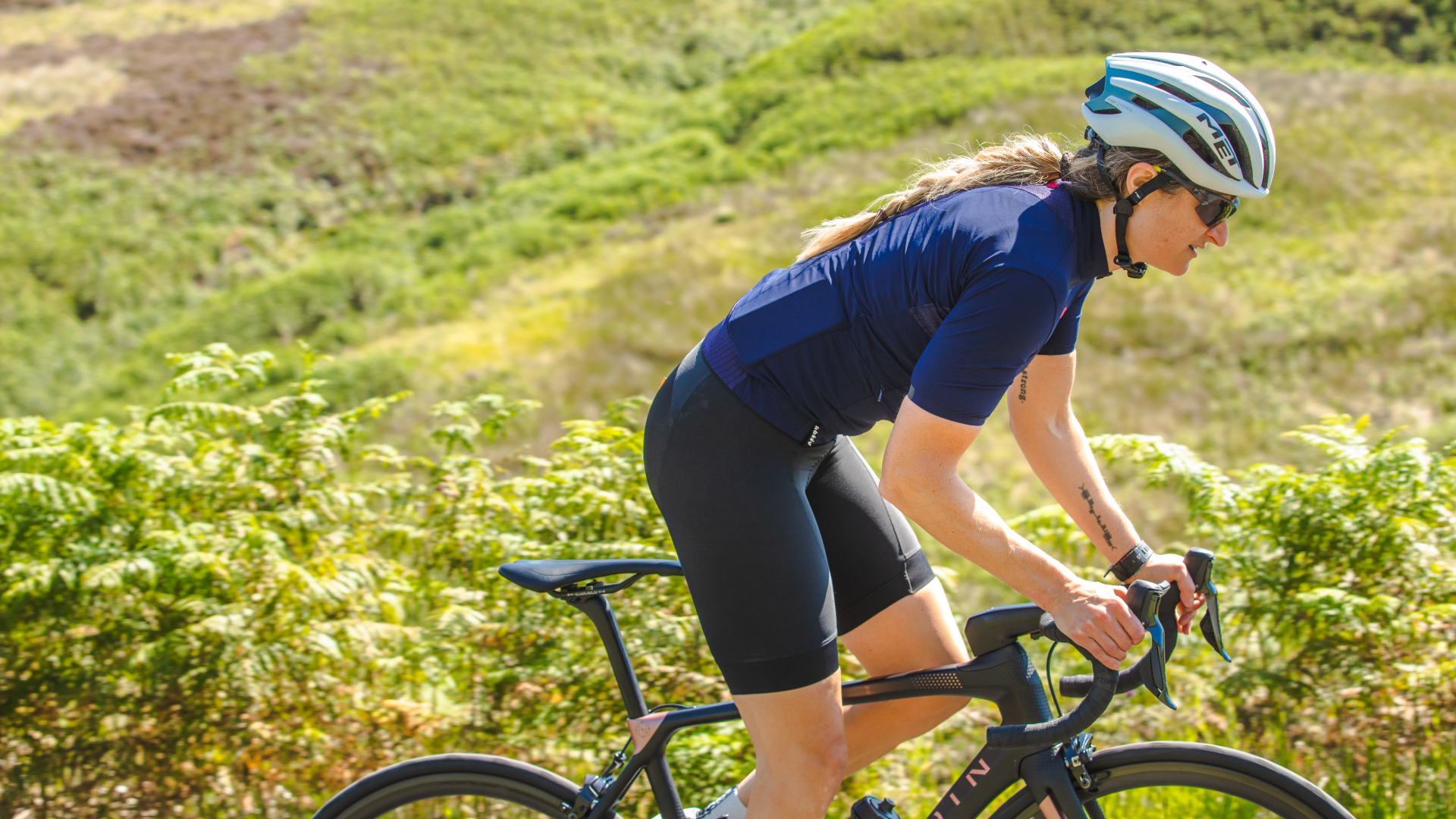Tern GSD S10 Cargo bike review - a genuine car replacement
The longtail electric cargo bike that actually changes family life
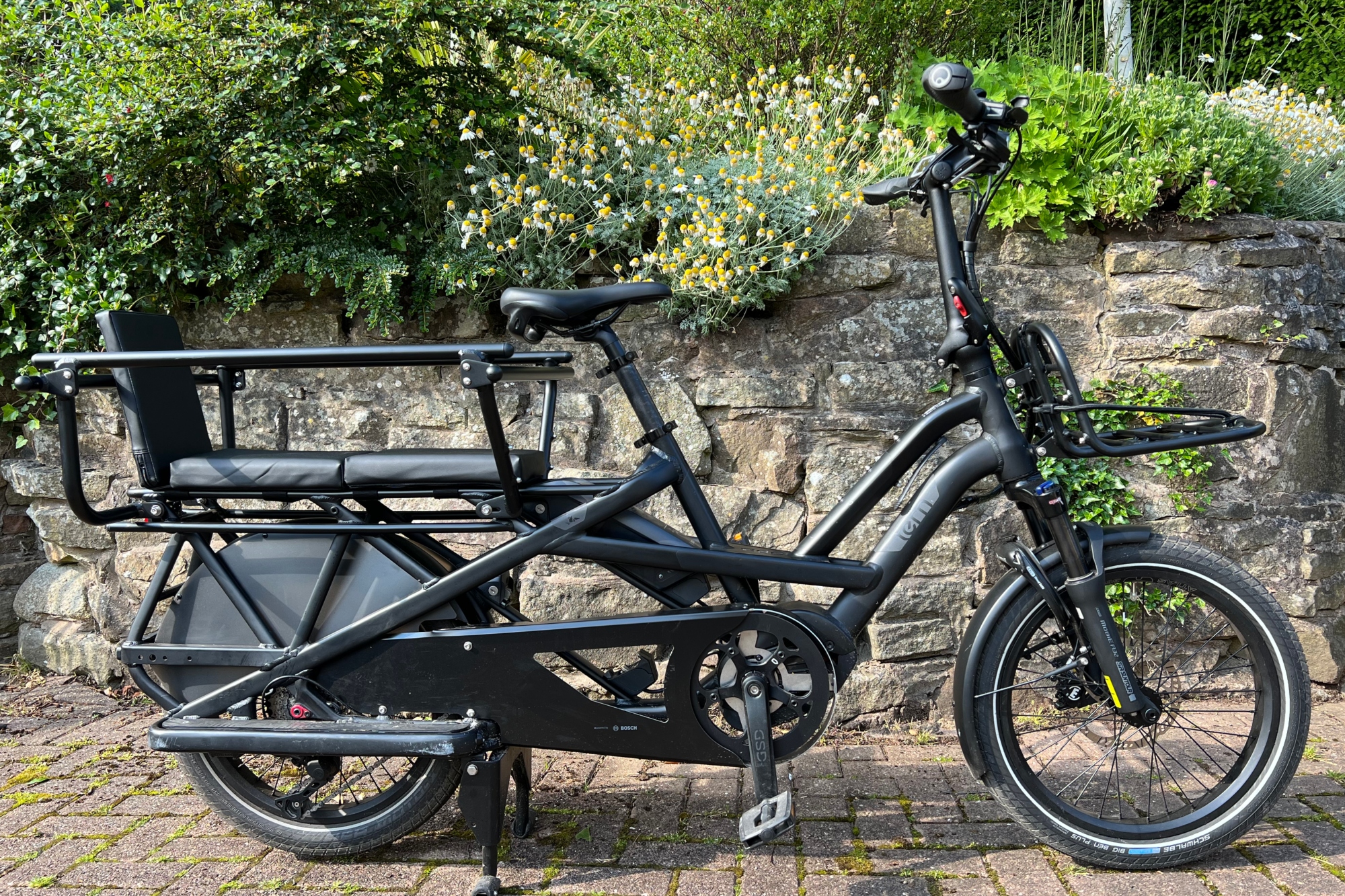
The incredibly easy to ride Tern GSD S10 cargo bike changed our family. It made us happier, saved money on fuel and genuinely improved my mental health. In just a couple of months, we've fully adopted the Tern GSD cargo life as a car replacement and we're a better family for it. It's taking the space of owning a second car more and more, and I've increasingly found myself pining for us to have gone by Tern instead. We're yet to face a winter together, but we've tackled torrential rain and gusty winds, and its still our preferred method of transport. Yes it's expensive, but the rideability and versatility is top notch, and it's now very much part of the family.
-
+
Rides like a regular bike
-
+
Powerful motor for hilliest of terrains
-
+
Versatility of rear carry frame
-
+
Front cargo space
-
+
Multiple accessories and set-up options
-
+
Fold-down handlebars and quick release seatpost for storage options
-
+
Integrated front wheel lock
-
+
Integrated lights, with brake light
-
-
Rear load design means you can't keep an eye on your cargo
-
-
Misses some basic data displays
You can trust Cycling Weekly.

As a busy family of three who live in a very hilly semi rural location, I'd always been sceptical of a cargo bike working for us, but I couldn't have been more wrong. Turns out, I can't live without one, but it has to be the right one.
Testing the best electric cargo bikes back to back has helped me identify that the Tern GSD S10 is the perfect one for me.
Tern GSD S10 - The construction
When it comes to the construction of a cargo bike, each one will be almost a unique concept. Often the only common ground between them is the ability to carry a large load.
But it's this uniqueness that will make you either fall in love or want to ride away from it after just one outing.
In the case of the Tern GSD S10, the love affair starts with the bike's geometry, a rear cargo hauling design with a super long wheelbase.
By my own estimates, it measures around 1,300mm. To put that in perspective, a Specialized Roubaix, one of the best endurance bikes, has a wheelbase of around 987mm (for a size 54), demonstrating how long the Tern GSD really is. Add this length with the low down cargo position, and the bike gains incredibly stability.
The one size fits all frame design can be augmented to fit riders between a suggested range of 150 - 195 cm (59.1 - 76.8 inches) thanks to the adjustable seatpost, which has a claimed range from saddle to pedal of between 69 - 105 cm (27.2 - 41.3 in).
The latest race content, interviews, features, reviews and expert buying guides, direct to your inbox!
The seatpost to handle bar range can also vary between 49 - 59 cm (19.3 - 23.2 in) which, in part, is down to the Tern Andros adjustable stem.
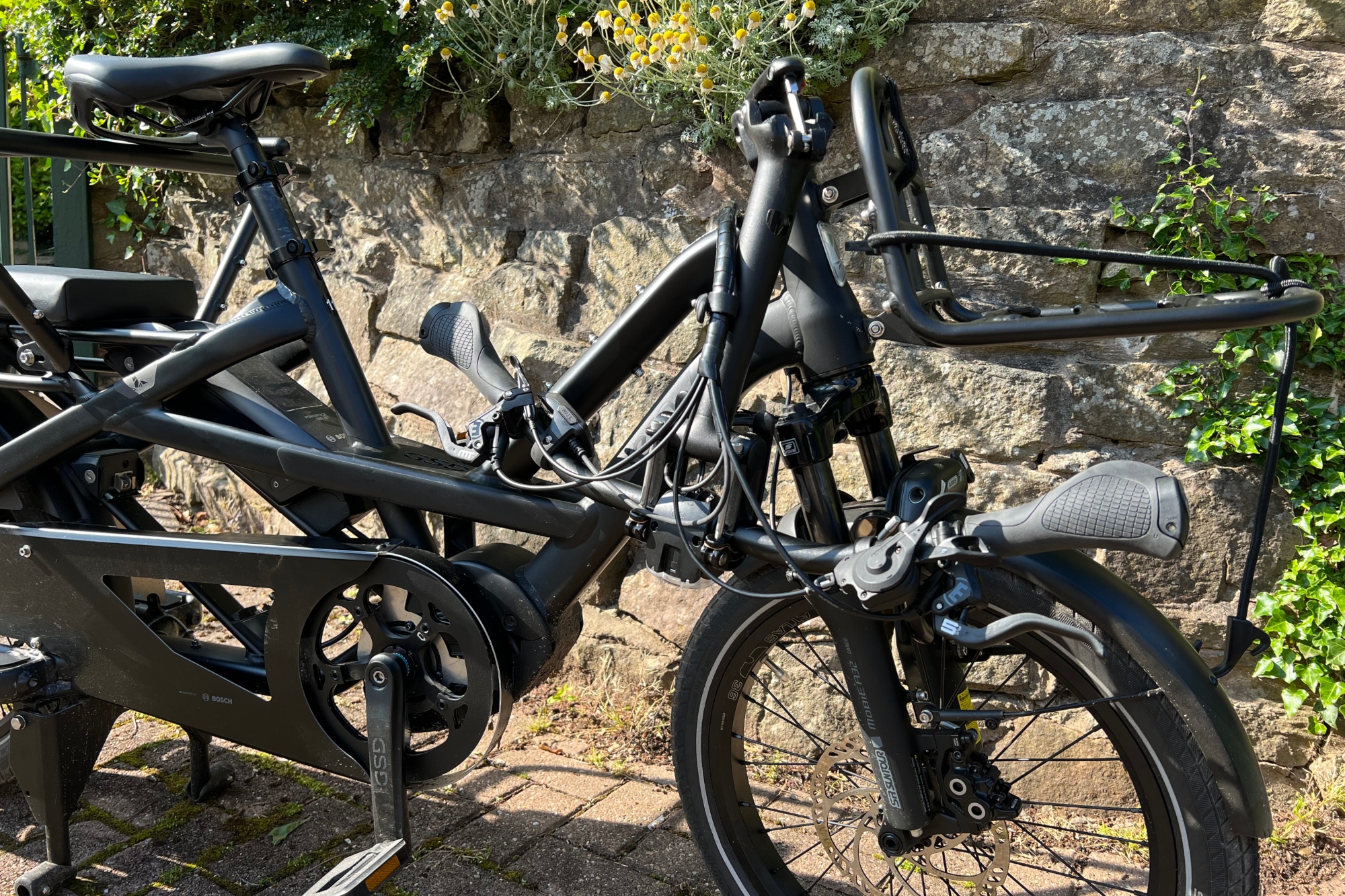
This does mean the bike requires some extra leg room when storing the bike. Although, the overall height of the bike can be reduced by about a half at the front end, due to a folderble steerer, reducing the overall folded size to 176 × 40.5 × 83 cm (69.3 × 15.9 × 32.7 in).
The longtail design of the Tern GSD S10 requires a robust frame, strong enough to withstand a maximum gross vehicle weight of around 200kg/ 440lbs, so it comes with a fair amount of reinforced bracing, especially at the rear end. This, as you might imagine, along with the electric system adds up to quite a hefty package.
In fact, like all the cargo bikes I've ridden thus far, I haven't actually managed to use my regular bike scales to get an accurate weight, so I'm having to use the claimed weight of 33.58kg/ 74lb.
When comparing this to Mycle Cargo Bike of a similar longtail design, it's about the same, 33kg to 36kg, give or take a second battery, which weigh in the region of 4kg/ 8.8lbs.
Battery and Motor
But don't let this beefy bike's scale numbers put you off, that aforementioned Bosch power set up is the gold standard for electric cargo bikes. Specifically designed for the job, it's the same as the Raleigh Stride uses, and it's considered the pinnacle of electric cargo bike systems.
According to Bosch, the Cargo Line offers up to 400 per cent of support as you pedal on the maximum turbo setting, with an additional three power levels to choose from below that in ever decreasing assistance, with Eco, the lowest level offering an an additional 60 per cent.
As with most electric bikes, and a legal requirement in most of the UK and Europe, its maximum speed with battery and motor assistance is 25kph. However, it's the torque which is even more important on a fully loaded cargo bike when compared to a regular electric bike.
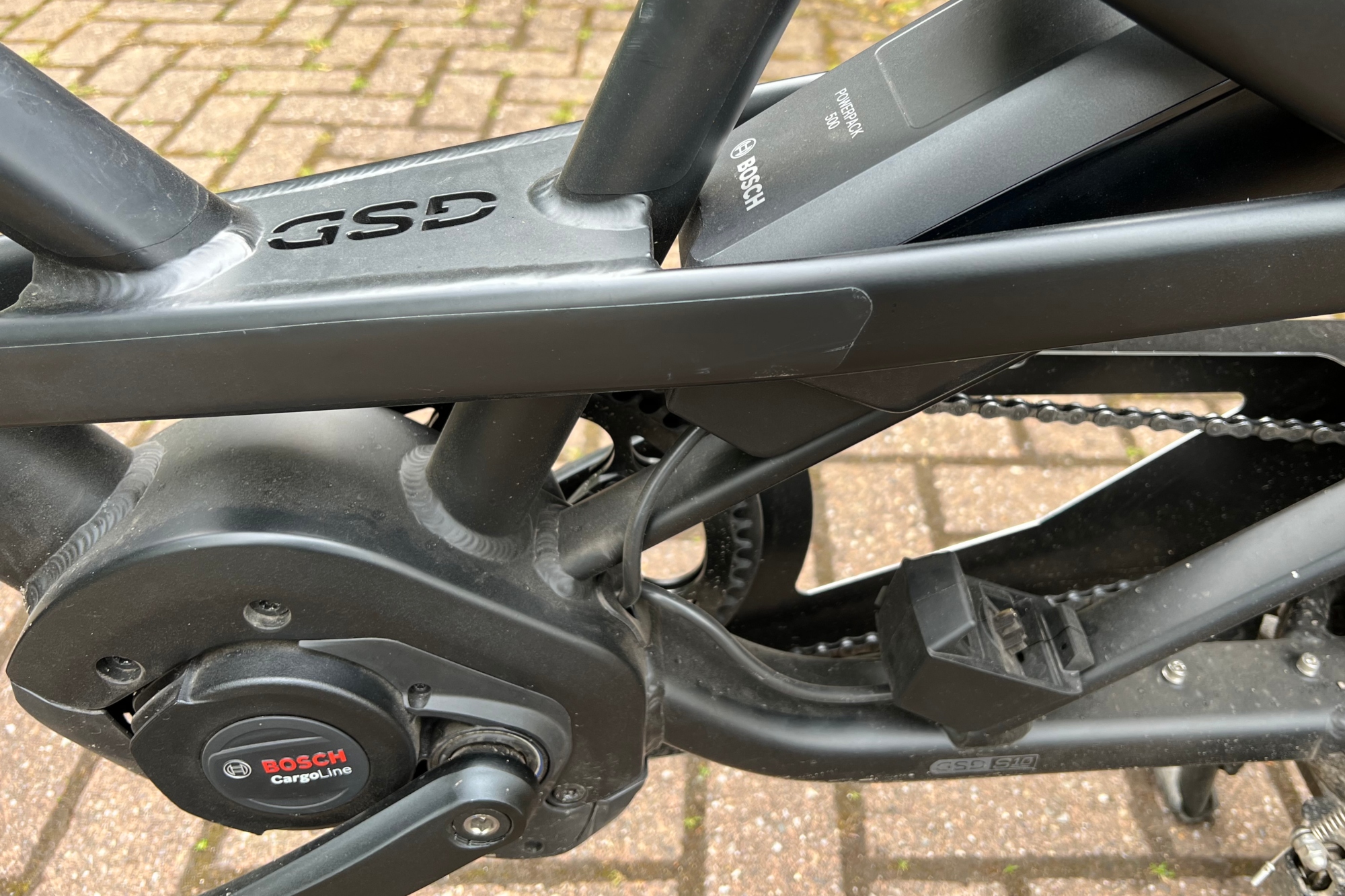
The Tern GSD S10 comes with Bosch Cargo Line motor and usually a Bosch Powerpack 400 battery
Bosch say it's Cargo Line most recent systems, 2021 onwards, deliver 85 Newton Meters (Nm) of torque. To put this in perspective, the top end Bosch Performance Line motor, which is generally spec'd for the gnarly terrain of e-mountain biking, provides 65 Nm, with 85 Nm normally reserved for the Performance Speed Drive unit, which is for a totally different kind of electric bike that delivers top speeds of around 45kph. In short, there's a lot of torque power on offer here.
Like all electric bikes, the range will always vary massively depending upon terrain, load, weather and dual or single battery set ups. While Tern suggest a generous 'up to' range of 195km (121 miles) the rather handy Bosch range assist calculator can give you a much better idea as to the typical range you would get between charges.
Set up
While a bike's total mass doesn't impact on compliance, as anyone who has ridden a lightweight aero bike will attest to, after the frame design and geometry, a significant part of the ride feel comes down how the frame is dressed
The Tern GSD S10 has been designed specifically with rider and passenger well-being in mind. Custom Suntour forks, which come with 70mm of travel set the tone for how comfortable the bike aims to be.
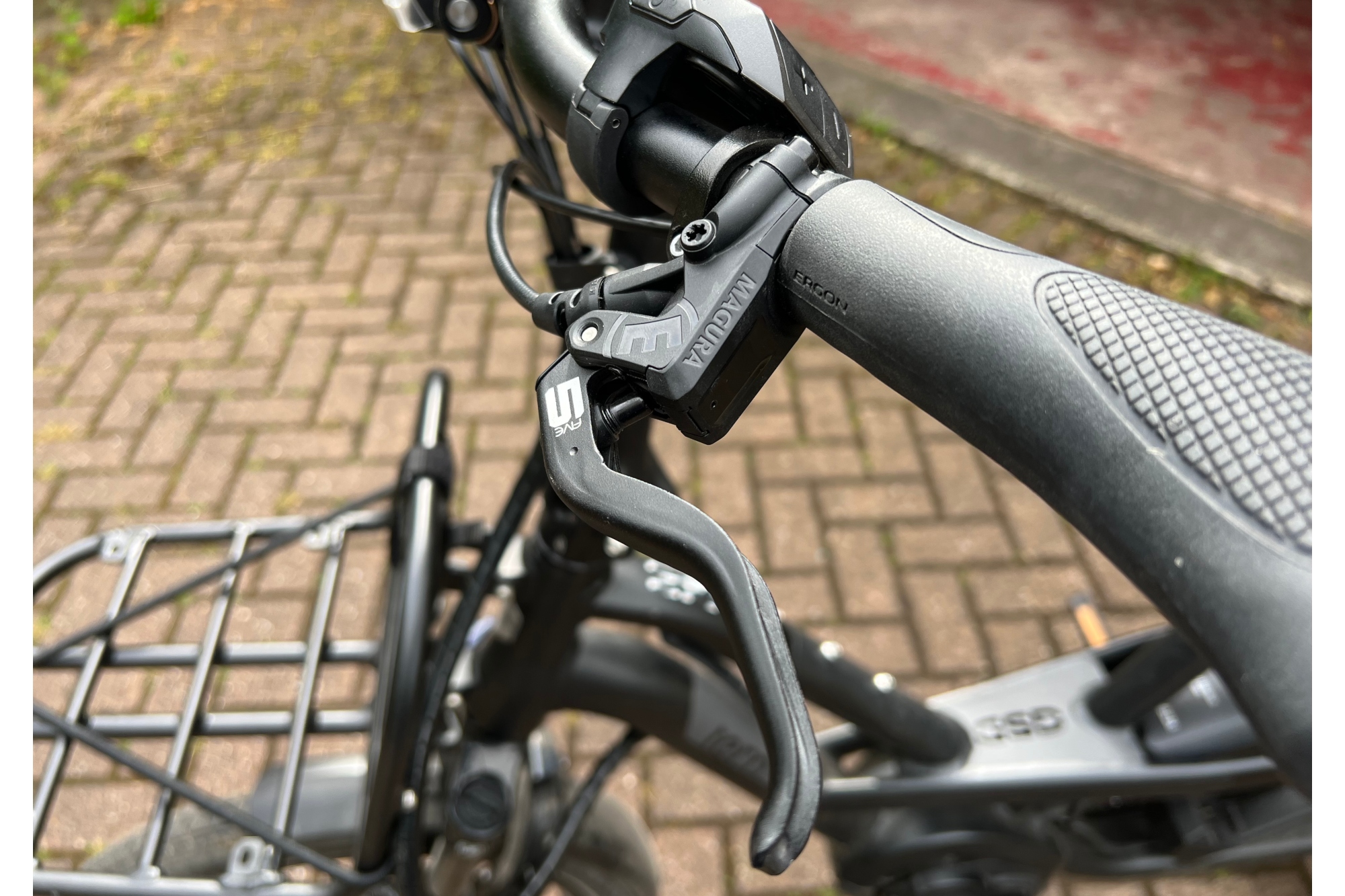
Magura MT5 eStop hydraulic disc brakes offer total control.
Teaming the forks with the Magura MT5 eStop hydraulic disc brakes and Shimano Deore 1x10, 11-36T speed aims for cushion and control.
As everyone knows, control + confidence = happy rider, so the sentiment is continued down to the tyre contact. An ultra wide 2" Schwalbe Big Ben front tyre and specific cargo bike designed Tern x Schwalbe Super Moto-X tyre rear both feature Green Guard puncture protection and reflective side walls for visibility. This partnership aims to provide the sweet spot between grip, rolling resistance, puncture protection and comfort from the bottom up.
Talking of bottoms, the Tern GSD S10 is also equipped with it's own branded saddle, which comes with a built in handle at the rear, on top of a Tern telescope aluminium seatpost.
Elsewhere the cargo bike comes with an integrated Abus Wheel Lock, lockable batteries, and front and back lights, with a built in brake light too.
Cargo set up
Just as important as the construction, motor system and spec on a cargo bike is how much you can customise it to meet your carrying needs.
As standard the Tern GSD S10 comes with a rear rack and lower decks. The version I tested came with a simple Club House, a frame and padded seats, as well as a Hauler rack out front.
Doing a quick on line search of the Tern bicycle accessories and there's probably not an accessory you could want for. From pet transportation to fully waterproof storm shield tents for your passenger, it's just a case of choosing what set up works best for you and your needs.
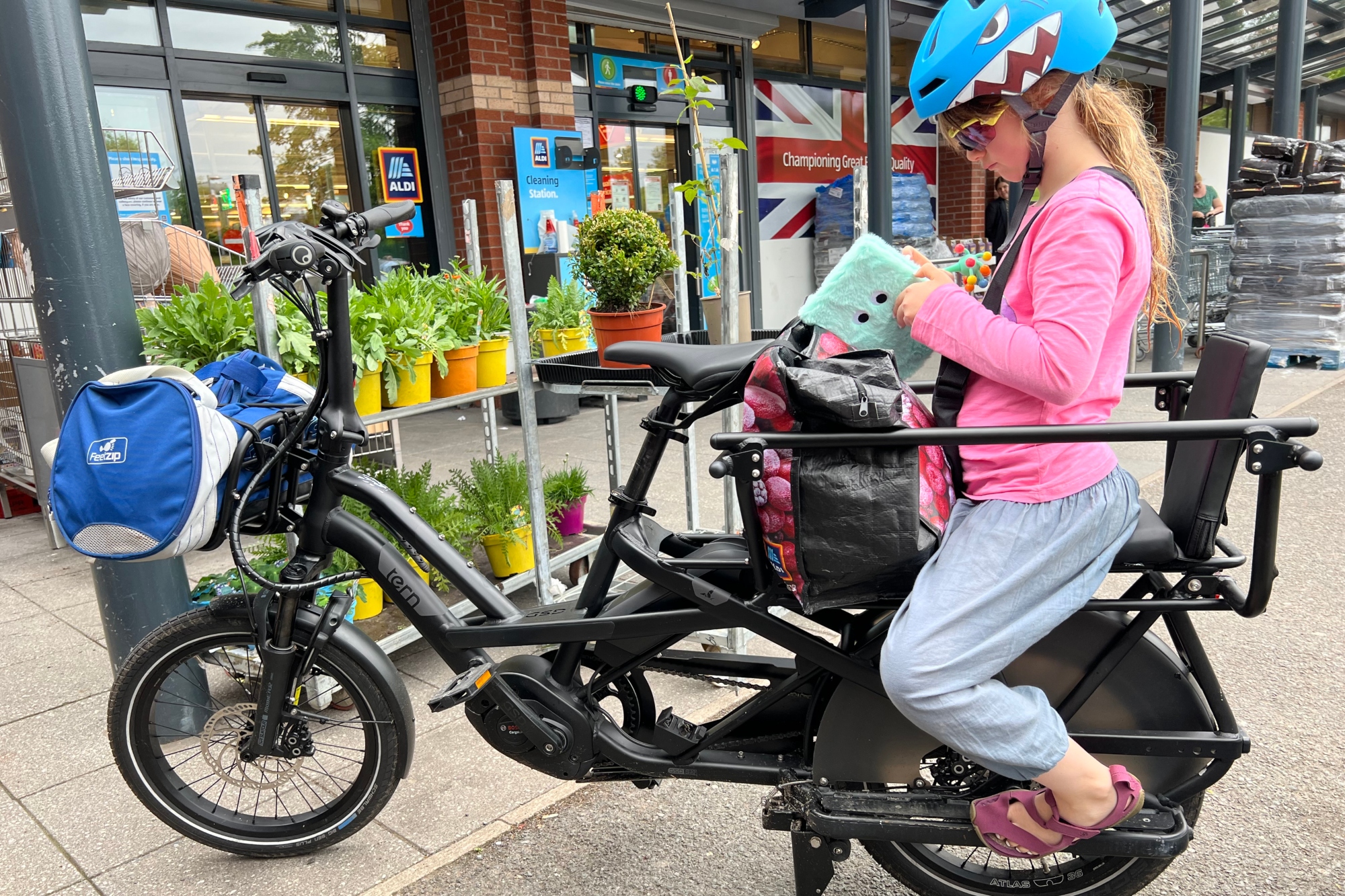
The ride
As a family of three, whose daily lives don't follow a ridged routine, I was concerned that without a regular local school run there wouldn't be much space for the Tern in our lives. But somehow we're a couple of hundred miles in to our time with the Tern GSD and we're all absolutely smitten.
From the first spin on the bike I could tell the clever people at Tern had invested a lot of time on getting the geometry and spec spot on, as it felt as close to riding a regular bike as possible. I actually found it even easier than riding a road bike with panniers.
Back to back riding with the likes of the Raleigh Stride and the Mycle cargo bikes confirmed it is indeed a special ride, with no requirement for a settling in period as I had with the other two.
I'm as comfortable as riding this with an 8-year old on the back and heavy shopping bags front and back as I am riding any bike on my own, which is a huge deal when questioning cargo bike ownership.
The level of nimbleness for such a long and heavy bike is impressive. It's, more or less, the same width as a regular bike meaning that there isn't really anywhere the bike can't go. We hit roads, trails, canal tow paths, and not once have I had cause for concern on the bike's stability or abilities, no matter how loaded, steep the incline or decline, or rough the terrain.
It's clearly an exceptionally comfortable ride for passengers too. My sidekick regularly took a pen and pad for on the move drawing, along with a soft toy companion and journey snacks. She happily sat cross legged, not feeling the need to hold on, thanks to the wraparound frame, which secured her on the bench seat.
Our only passenger issue was the moment the 8-year-old worked out the whole 'steer with your butt' concept still reigned true for back seat riders. She swerved us across the road to a jump that I had just said 'no way on a cargo bike with you' to.
I think she was shocked that her movement had made such a big impact to the handling, and after a quick chat I'm confident that she wouldn't try the stunt again, but it's something to think about if you are cargo'ing kids and they're not in a specific child seat anymore. If you are concerned as to exactly what they're up to back there, it's worth investing in a bike mirror just focused on your own tail.
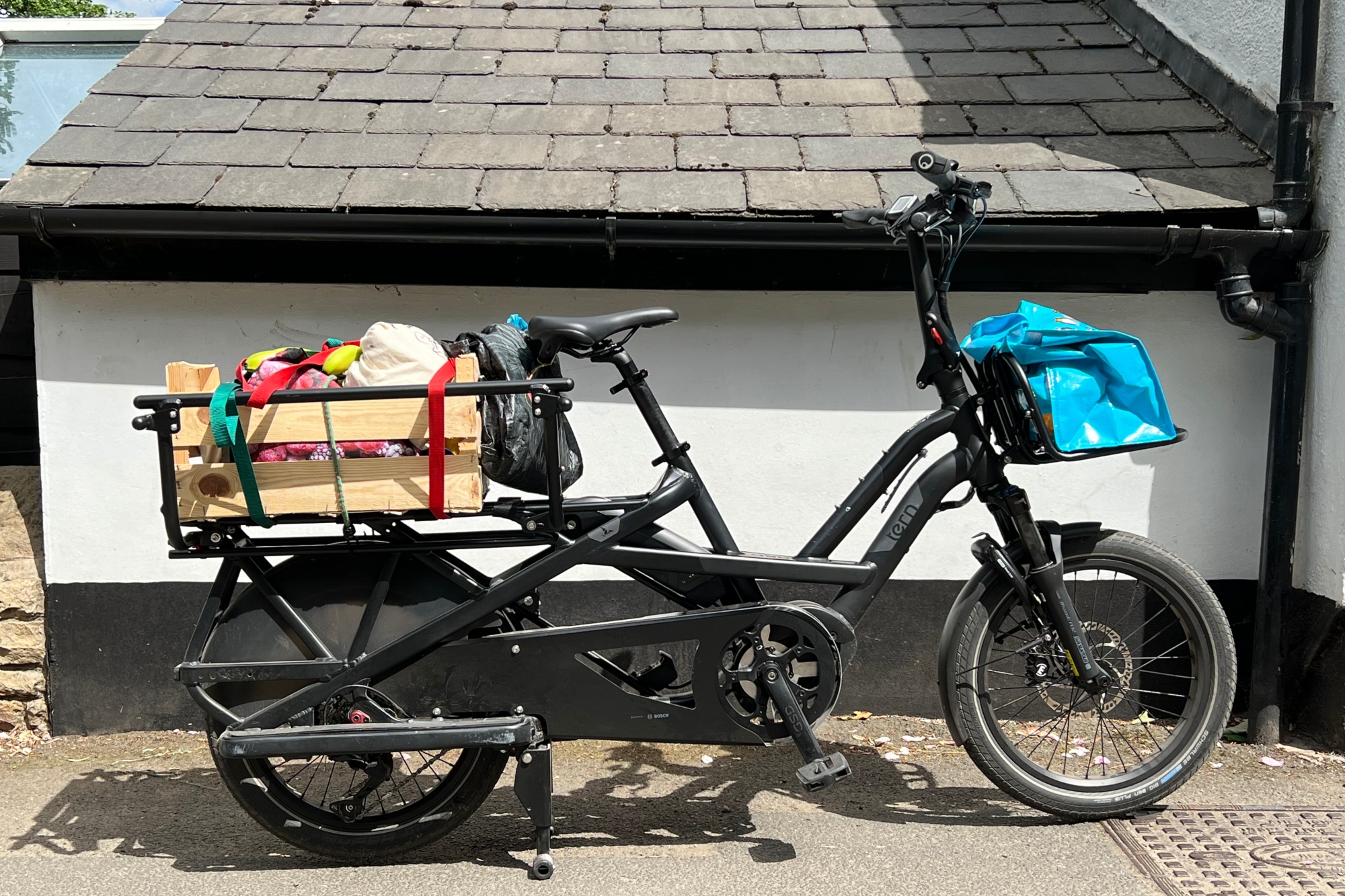
The weekly shop. A cheaper alternative to another accessory is adapting an existing wooden box and strapping in the Club House.
Power and performance
Living in a disproportionately hilly location, the local terrain isn't a fair representation of most peoples riding, but even when a local ride to the shops requires several hundred feet of altitude change, when sticking the Tern GSD S10 in turbo mode, you could very well be riding on the flat, even when fully loaded.
The responsive Bosch Cargo Line motor and battery are sublime. The pedal assist kicks in at the exact moment you need it too, especially when pulling away from a junction on a hill.
My test rig actually came with a 500Wh battery, which gives around an hour extra run time over the standard 400Wh battery.
As with all cargo bikes, you need to make sure you are in the right gear before coming to a slow or stop. The extra power from the motor can override your normal sense of gear shift requirements, and its not until you go to pull away from a stop, that you realise you are in one (or three) gears too big. Cue the embarrassing bike straddle walk out of a junction and occasional un-ceremonially ejecting of your passenger while you get the bike out of a steep uphill position.
To be fair, you only do this a handful of times before the shame etches on your brain and you remember the need to always click up to a bigger sprocket when coming to a slow or stop. It does however make you realise just how great it would be to have the Enviolo NuVinci gear shifting system that comes with the Raleigh Stride.
This set up not only does away with the whole concept of sprocket sizes and sprocket sized dependent step gear changes, but also allows you to rectify the 'too big gear' error, even when stationary, with a simple throttle twist.
In terms of range, the aforementioned terrain is the dominant factor here, and within a three mile radius of my home, I wouldn't get very far without being in Turbo or Sports settings.
This max power setting sucks the battery way quicker than eco mode, which I've only found myself in once on a flat tarmacked canal path with no destination time commitments.
As such the battery range is way under the estimates that Tern propose of up to nearly 200 kilometers (121 miles) and more like 40 kilometres (25 miles).
Cross checking this against the Bosch range assist website tool, and it's spot on. I highly recommend visiting the page when spec'ing your e-bike, rather than going off the brand's ideal riding environment numbers.
Personally, I'm more than happy to recharge after most rides, or once I've just dropped to one battery bar, but if you did need a bigger range / more time between charges, you can always upgrade the as standard 400Wh battery to the 500Wh one, and/ or purchase an additional one, which is easily done with a spare battery port on the bike ready to be docked to.
Practicalities
At 5ft6" (167cm), I found the bike really comfortable to ride, as did my 5ft10" (177cm) other half. The saddle can move up and down quickly as can the rotating the bars to get the right height and comfort.
I'm fortunate enough to have a large garage attached to the house with power, that meant charging and storing the bike was simple.
This did mean I wasn't lugging the bike up steps and round corners to get it in to a house, or require the use of the space saving fold down front end.
I was super thankful for the integrated lights, with built in rear brake light. I felt much more visible on the all-traffic roads we needed to ride on, and are a total necessity if you're out in twilight or in the dark. Not having to think about charging/ attaching them was so helpful.
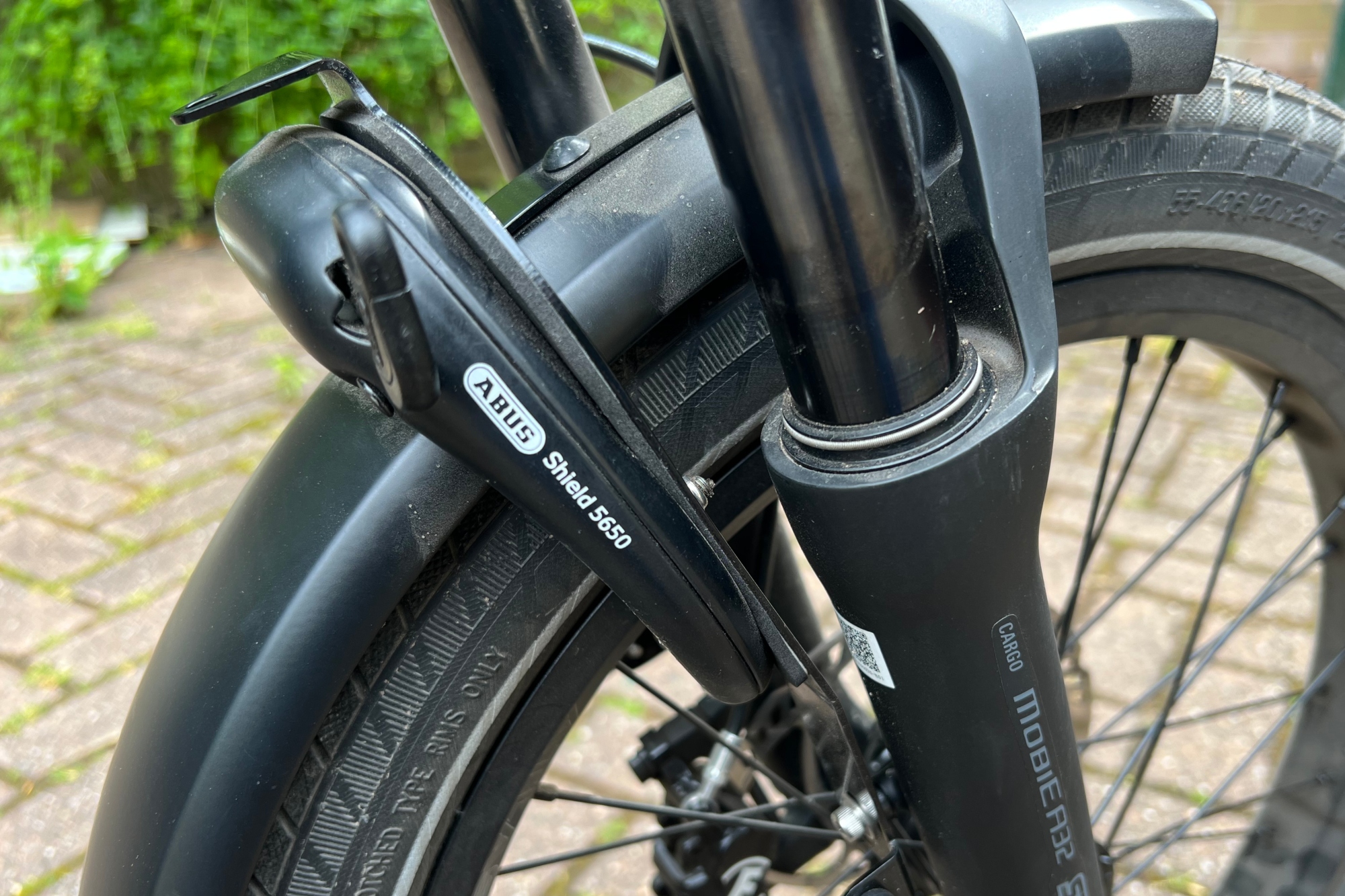
The integrated ABUS Shield 5650 lock was incredibly handy.
The integrated ABUS front wheel lock is excellent, easy to use and always attached to the bike. Although I often took an additional D-Lock out and about for attaching it to railings and bike stands.
I'm still nervous about leaving the bike for long periods unattended where there was no real secure bike storage - which is most places away from home. It's frustrating, but something I might just need to brave, once I have the best e-bike insurance, as it's hindering some of our use by not wanting to leave it at the train station.
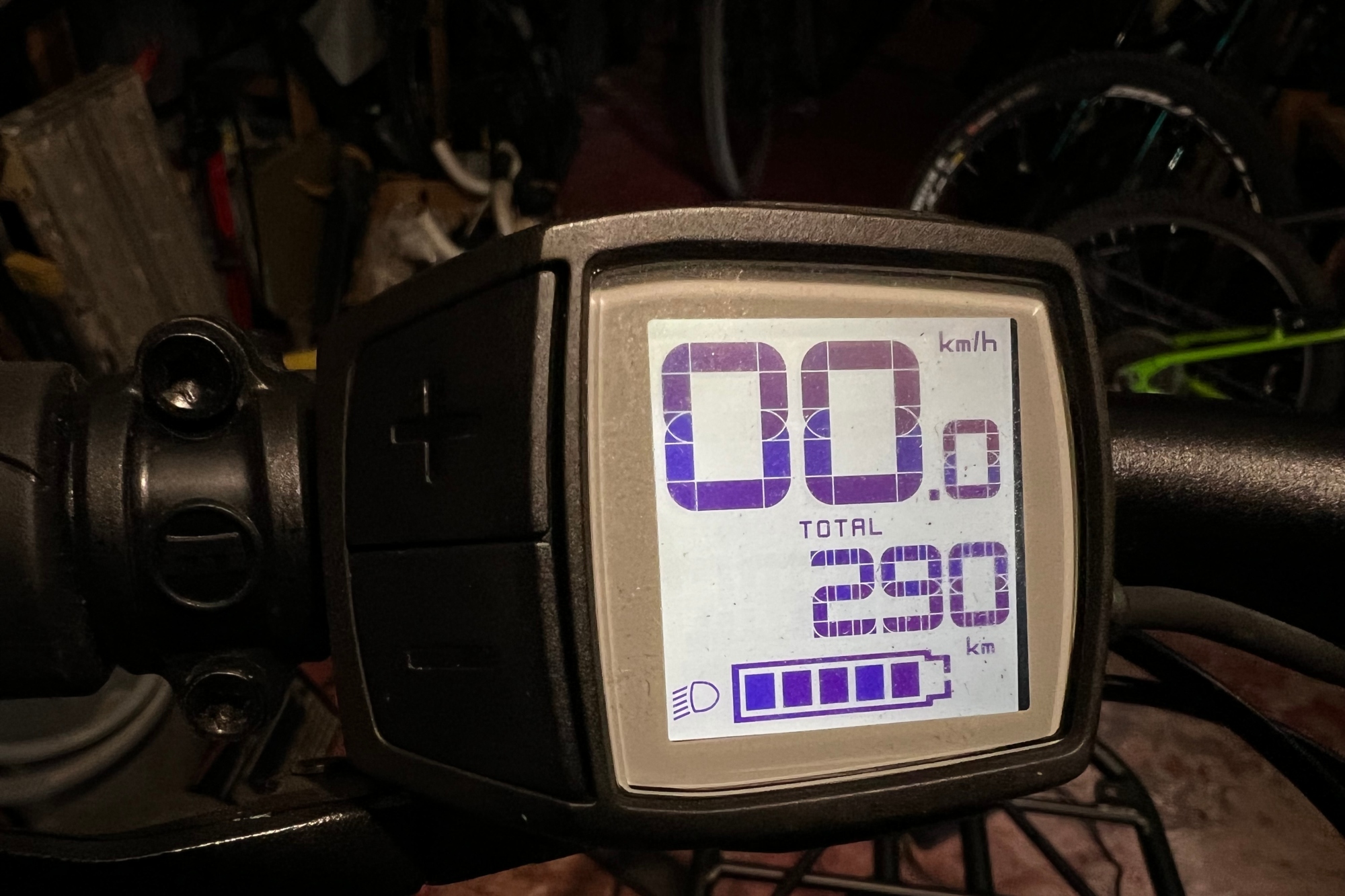
The Bosch Purion really needs to display the current time to make it absolutely perfect.
My only nagging point on the Tern GSD S10 is the Bosch Purion display is so basic. It does allow you to toggle between modes super easy, gives you speed and total trip miles, but no current time.
Ideally you also want a built in satellite navigation too, but I accept that is an expensive accessory for a brand to spec. It's just a little galling to make an additional purchase just to make sure you aren't going to be late after splurging on the bike in the first place.
The other additional cost to think about will be your cargo set up. My test rig was on the more basic side, but would still add up to nearly an additional £400. Realistically to ride year round, I'd also need to invest in a Storm Shield to keep out the bad weather for my pillion, which would set me back an additional £230.
Value
A bike of this quality is never going to be cheap, and the RRP of around the five thousand pounds/ dollars, will always be met with a sharp intake of breath.
But as a family, we've all found it to be a total lifestyle changer.
It's saved a lot of money at the petrol pumps, a shed load of time in not sitting in traffic, and most of all it's improved my mental head space.
On the times when it would have been quicker by car, we've just factored in extra time, gone by bike and arrived as genuinely happier people than when we set off.
We've even just gone for an evening spin just because! I guess it's a similar feeling of getting a dog to get you out the house more. Ok. so you can't snuggle on the sofa with it, but it's doesn't come with vet bills and is a lot cleaner.
It is an expensive bike, but if you want first class performance on a highly rideable and versatile bike, it's the price you need to pay, and I would buy one in a heartbeat.
Specs
- Frame: Tern GSD, 6061-AL, patented MultiTruss design
- Fork: Suntour custom for Tern, 1.5" tapered Chromoly steerer, 32 mm stanchions, Thru-axle, 70 mm travel
- Drive train: Shimano Deore, 1 x 10 spd
- Brakes: Magura MT5, 4-piston hydraulic disc, 180 mm rotor
- E-System: Bosch Cargo Line 400Wh (LX version 500Wh) dual battery option
- Wheels: Tern Atlas
- Tyres: Front -Schwalbe Big Ben Plus, Rear- Tern x Schwalbe Super Moto-X
- Bar: Tern Physis 3
- Stem: Tern Andros, adjustable
- Seatpost: Tern Telescope, 34.9/30.9 mm
- Saddle: Tern GSD by Velo
- Weight: 33.58 kg (74 lb) (claimed)
- Size: One size
- Cargo capacity: 200kg Max gross capacity
Hannah is Cycling Weekly’s longest-serving tech writer, having started with the magazine back in 2011. She has covered all things technical for both print and digital over multiple seasons representing CW at spring Classics, and Grand Tours and all races in between.
Hannah was a successful road and track racer herself, competing in UCI races all over Europe as well as in China, Pakistan and New Zealand.
For fun, she's ridden LEJOG unaided, a lap of Majorca in a day, won a 24-hour mountain bike race and tackled famous mountain passes in the French Alps, Pyrenees, Dolomites and Himalayas.
She lives just outside the Peak District National Park near Manchester UK with her partner, daughter and a small but beautifully formed bike collection.
